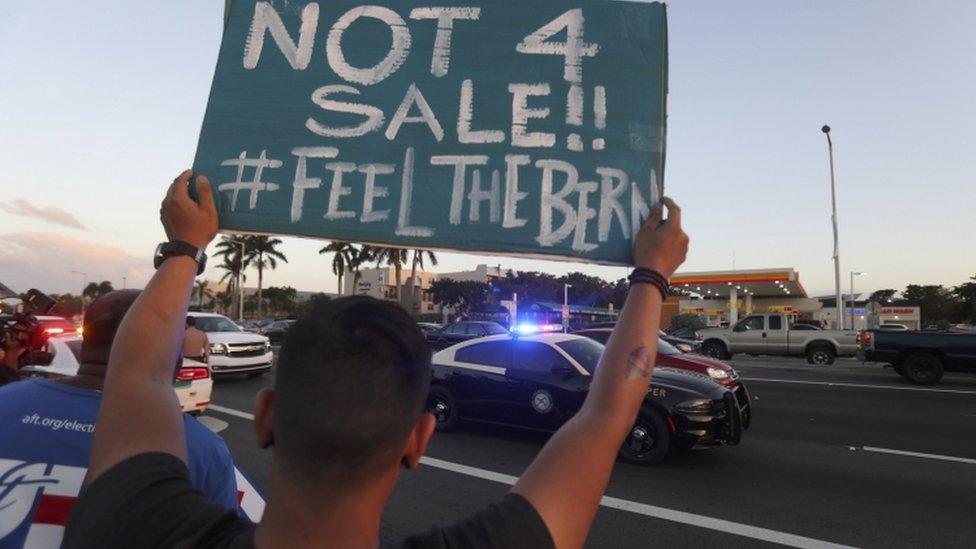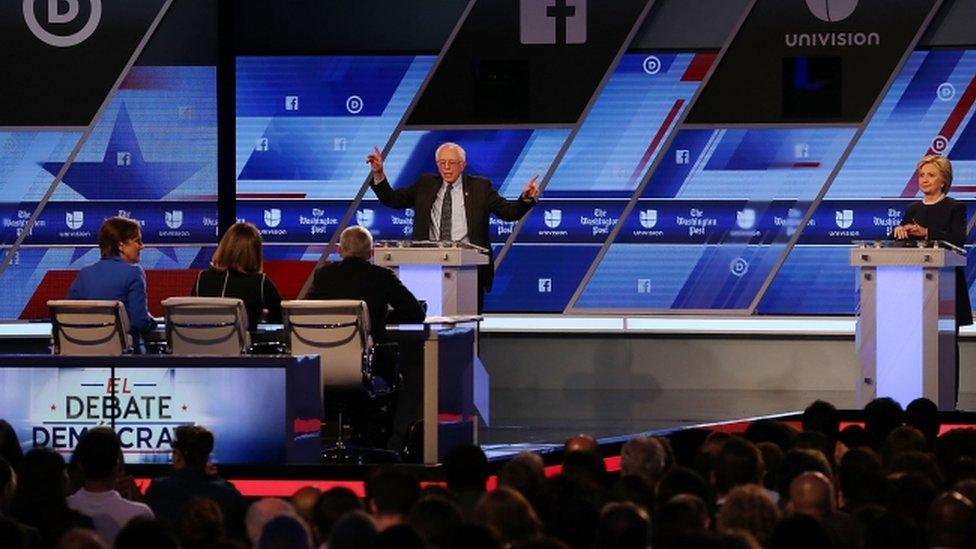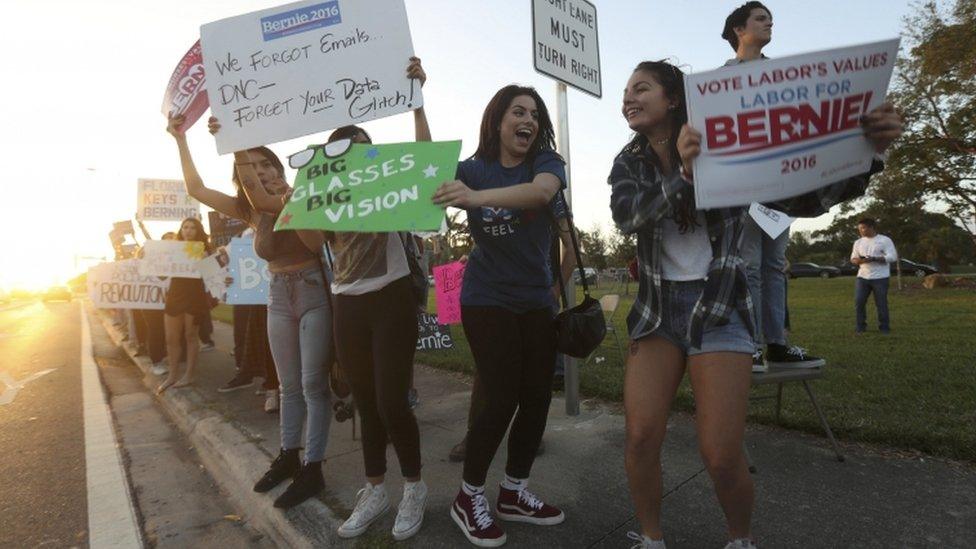US election 2016: Is Michigan the start of a Sanders surge?
- Published

Sanders supporters back their man at the debate venue in Kendall, Florida
It was a small, exuberant crowd of Bernie Sanders supporters that gathered near the site of the Democratic debate at Miami-Dade community college on Wednesday night.
"We believe that we can win," they chanted as they waved at passing cars.
While their candidate still has an uphill climb to the Democratic nomination, the odds are better than they were just 24 hours earlier, when the Vermont senator pulled off an improbable upset in Michigan's primary.
Prior to that victory, it seemed the Democratic race was settling into a pattern that was increasingly discouraging for the Sanders camp. While he found success in smaller, less ethnically diverse states, Hillary Clinton was posting convincing victories in larger states with sizable minority populations.
The former secretary of state was steadily increasing her lead among delegates to the Democratic National Convention, with little indication that the trend would reverse.
Then the trend reversed, thanks to Michigan.

Sanders supporter Patrick Mesa: "I've never been so passionate about anything"
More than a million Democrats and independents, in a state that is about a quarter non-white, gave Mr Sanders a narrow win, despite polls predicting an easy Clinton victory.
Now the polls showing Mrs Clinton with solid leads in the next states to vote have been cast into doubt. If the Vermont senator can post a win in Michigan, why can't he also beat Mrs Clinton in nearby Illinois and Ohio, for instance?
Humbled
The changing nature of the Democratic race was clearly on display during Wednesday night's debate. Mr Sanders appeared more confident thanks to his recent success, and quickly went on the attack against Mrs Clinton over her ties to big business.
He called on her to disclose the text of a highly-paid speech to investment bank Goldman Sachs and noted that she had accepted millions in campaign donations from Wall Street firms.

Centre stage. Is Bernie right back in the race?
"When you get paid $225,000, that means that that speech must have been an extraordinarily wonderful speech," he said. "I would think that a speech so great that you got paid so much money for, you would like to share it with the American people."
Mrs Clinton put up a spirited defence, but she was clearly humbled. When asked why some Democratic voters seemed to be reluctant to support her, she admitted her shortcomings.
"I am not a natural politician, in case you haven't noticed, like my husband or President Obama," she said.
"So I have a view that I just have to do the best I can, get the results I can, make a difference in people's lives, and hope that people see that I'm fighting for them and that I can improve conditions economically and in other ways that will benefit them and their families."
The two candidates also sparred over immigration reform, foreign policy, healthcare and climate change. It was in these last two exchanges that the real differences between the candidates were exposed. Mrs Clinton preached pragmatism, while Mr Sanders painted in bold colours.
His plan to enact universal healthcare coverage involved having "the American people stand up and fight back". His solution to climate change was a "political revolution in this country".
"I'm the only candidate who says no president, not Bernie Sanders, can do it all," he said.
'We are our own media'
Outside the debate hall, the Sanders supporters revelled in what they see as a potential turning point in the campaign.
"When I saw he won Michigan I was absolutely shocked," said Patrick Mesa, a recent graduate of Miami-Dade College. "I've never been so passionate about anything. I feel like I'm actually growing as a person along with this campaign."
Melanie Larson, a senior at nearby Coral Gables Senior High School, said the recent upset showed that Mr Sanders could also win on Tuesday in Florida, where he trails in polls by margins similar to those in the days before the Michigan vote.

The youth vote has been one of Mr Sanders' targets
While the crowd had harsh words for Mrs Clinton, whom they called inconsistent and out of touch, they reserved some of their sharpest criticism for the press, which they say has been underselling their candidate.
"The media can do whatever they want to prevent us from getting Bernie's ideas out, but what they don't realise is that they can no longer control the internet," said Karen Caudillo, a student at Miami-Dade college. "We no longer need the media. We are our own media."
After his victory in Michigan, however, the media coverage of Mr Sanders has largely been favourable. A winning story is a positive story.
Now the challenge for Mr Sanders is to capitalise on the momentum generated by his Tuesday night surprise. Florida, which is much more like the southern states Mrs Clinton dominated, could give Mrs Clinton a boost. But Mr Sanders' sharp anti-trade rhetoric and blue-collar economic appeal may be taking hold in the Midwest.
Success in Illinois, Missouri or Ohio could mean next Tuesday's results are at least a draw - and then the Democratic race heads to locations that could be friendlier to Mr Sanders, with caucuses in Idaho, Alaska and Washington, and primaries in Utah and Arizona. He'll need to post some solid victories as the days go by to eat into the lead Mrs Clinton has built so far.
The Sanders supporters in Miami believe their man can win. We'll know soon if it's anything more than just an optimistic chant.

The next votes
15 March: Florida, Illinois, Missouri, North Carolina, Ohio Primaries
22 March: Arizona Primary, Utah Caucuses, Idaho Caucuses (Democratic)
26 March: Alaska, Hawaii, Washington Caucuses (Democratic)
1 April: North Dakota Caucuses (Republican)
5 April: Wisconsin Primary
9 April: Wyoming Caucuses (Democratic)
19 April: New York Primary
